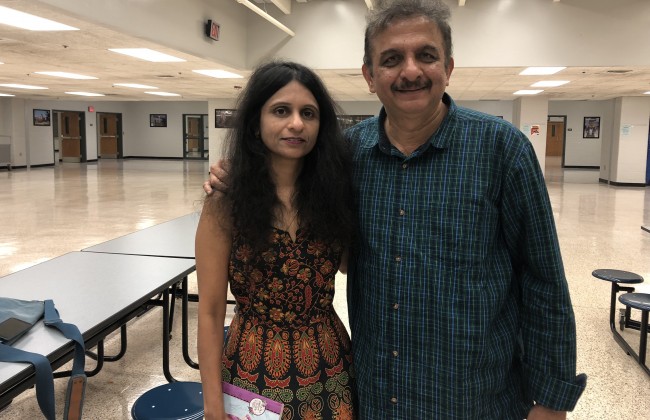BY JYOTHSNA HEGDE
Atlanta, GA, October 11, 2018: It was hard to spot the most popular, reigning writer who pens lyrics, poems, stories for chartbusters in Kannada movies among the crowd. Modest to a fault, mingling with random people, wearing simplicity and smile in equal measure, Jayanth Kaikini seemed at home, unperturbed by fans or fame. Assertive yet empathetic, restless yet restrained, it was refreshing to catch up with the Kannada literature connoisseur Kaikini, at the Nrupathunga Kannada Koota 45th Anniversary celebrations, where he presided as one of the chief guests. In an exclusive with NRI Pulse, Kaikini talked about his works, worldviews and much more.
“Writing is a mode of thought for me. My writing navigates me, I don’t navigate my writing, just surrender,” says Kaikini about writing. Having grown up with a stalwart journalist dad, Gourish Kaikini, who introduced Kannada readers to Karl Marx, Kaikini still did not instantly take to literature. While he admits to his father being an inspiration, along with Yashwant Chittal, whom he considers his guru, his first writing was about “Fever”. What?
“I had a bout of fever when I was about 15 and after I got better decided to write about it. Then I wrote about Basale soppu ( kind of greens),” he laughs.
Kaikini says he found himself drawn to poetry when he moved to Kumta to study. The Gokarna-born Kaikini, went to Dharwad to complete his Masters in Bio-chemistry, and Mumbai to look for a job. While he went on to work in pharma, literary magazines, TV channels and finally films, his love for literature eventually brought him back to Bangalore, where he currently resides with his wife and two kids.
Kaikini has six short-story and five poetry anthologies, three collections of non-fictions, and three plays to his credit. He is also a much sought-after lyricist, script and dialogue writer in Sandalwood.
“Poetry is the smile of life. It should be a journey and not a destination,” says Kaikini and his poems bear testament to his view. Blending spoken language to his lyrics seamlessly, sautéed with unblemished, uncontaminated usage of Kannada, tempered with metaphors, similes, images and idioms that even youth can relate to, Kaikini simmers his work to tasteful poetic perfection, Haage summane..(just like that).
“When I write for movies, it is not my worldview, it is roleplay,” says Kaikini about the difference between his own writing and writing for movies. Kaikini forayed into the movies as a script writer for Chigurida Kanasu but his uncanny chemistry for words in his first song Anisuthide for Mungaru Male shot him to fame, altering lyrical landscape in Sandalwood forever.
Kaikini has been awarded Karnataka Sahitya Academy award four times, starting at age 19, for his short story collections, Karnataka State Award for best dialogue and lyrics, and the Filmfare Award for best lyrics in Kannada four times. He was honored as Zee Kannadiga of the Decade in 2016 and first recipient of Kusumagraj Rashtriya Bhasha Sahitya Puraskar in 2010. Kaikini was conferred with an honorary doctorate from the Tumkur University in 2011 for his contribution to Kannada literature, film and television. His latest book is an anthology of essays on cinema, and his latest short story collection, translated to English is titled No Presents Please: Mumbai Stories.
“Arts is a science and science is an art,” states Kaikini, citing examples of Yashwant Chittal, a polymer scientist, Nissar Ahmed, a geologist. “We have leaders with no scientific temperament planning thermal power plant in Western Ghatstotally oblivious to its dangerous effects on its flora and fauna. And then are the scientists who, before launching satellites look for Rahu kaala. This happens because of the gap in arts and science,” Kaikini, a biochemist by training, ruminates.
“We need good translators such as A.K. Ramanuja, who translated Vachanagalu to showcase Kannada literature to the world,” opines Kaikini pointing to Latin, German and Italian works translated to well written English, like original writings. “It requires a lot of selflessness, since you can write your own novel in the time you spend translating someone else’s work,” he adds. And he should know, having translated My fair lady to Sevanthi Prasanga, Fiddler On the Roof to Jathegiruvanu Chandira, Javed Siddiqui’s play ‘Tumhari Amrita’ to Iti Ninna Amrutha.
“It’s my dream to write a novel. But I’m restless. I write about 20 pages and turn it into a short story. To write a novel you have to spend at least two years with your characters and situations, without sharing them with anyone. That’s hard for me,” admits Kaikini. “Most people refine their own writing over and over. I’m not good at chiseling. Except for one or two stories, all my stories are first drafts.”
What is the hardest thing about writing, for someone like him? “Assigning a title to my work or, even naming my kids,” he smiles, his sense of dry humor on full display.
`Remember, it is your story that has won a prize, not you,’ Kaikini recalls Chittal’s words when he had won his first prize. And it resonates in his unfettered conversation, as he ventures into territories uncharted, led by where his mind meanders, oblivious to fame and recognition that endow him. “I think only when I write. I evolve only when I am writing.”
He chose the road less traveled and it has made all the difference.






